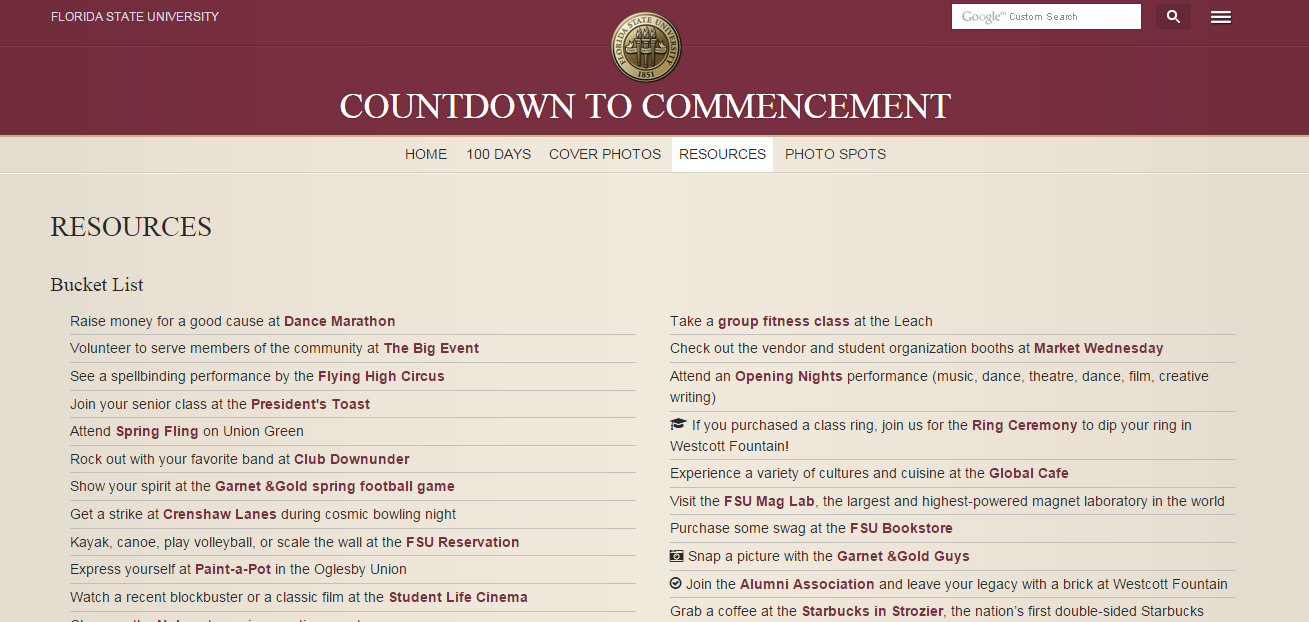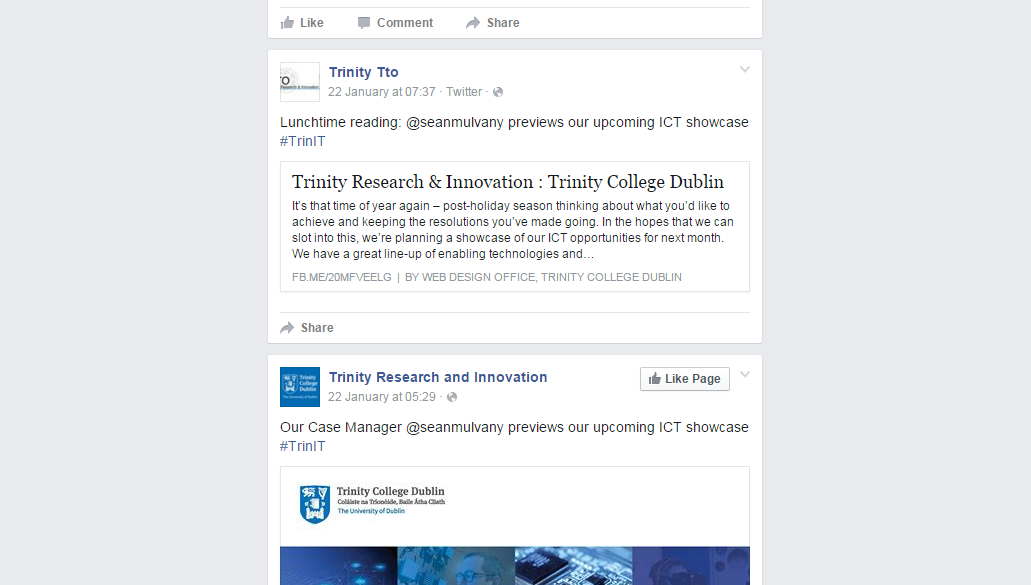Every college has dates on their calendar that are extra special. Sometimes it’s a legendary sporting occasion, such as the Oxford-Cambridge boat race or the Harvard-Yale football game. Other schools might host high profile academic conferences or mark historic moments in their history. Some even become heavily involved in famous events in their home city, such as Tulane University in New Orleans, which participates in various festivities around Mardi Gras.
These occasions are part of a college’s identity, a unique experience for their students that are unlike those at any other school. They are also an opportunity to connect with prospective students, and communicate your story and message at a time when your institution is at its most visible. So what is the best way to use events to promote your school?
Most colleges will feature significant happenings on campus heavily among social media updates and other inbound content on the web. But what if you went further, building a ‘micro-campaign’ around specific events, concentrating your online marketing around short-term activities to boost your profile and generate valuable new leads? Smaller, more focused campaigns are becoming more popular with recruitment professionals, and in this blog, we take a closer look at the idea of micro-campaigns and how they can give a short-term boost to your school.
What Events Are Ideal For An Online Recruitment Campaign?
While some of the examples listed above are well-known, you don’t need to be playing host to a major, renowned event to conduct an effective micro-campaign. With the proper research, a little creative thinking and strategic implementation, you can easily find something in your calendar that can be used to generate new leads while promoting your college’s brand identity. Here are some common event types that have potential for education lead generation:
- Academic events: Many schools host conferences, festivals and talks in fields such as literature, science and technology. Promoting these events is a great way to establish your institution in the minds of prospective students as leaders in the field.
- Recreational events: What’s the highlight of your student’s social calendar? If you’re hosting a concert, ball or any other event that’s sure to be great party, promoting it can help show potential applicants what a fun, active student life they can look forward to.
- Sporting events: If your school participates actively in any collegiate athletics, this can be a great plus for student recruitment. You can highlight big competitions and local rivalries. These games often include other social events on campus as part of the festivities, so you won’t just be appealing to sports fans.
- Historic events: If your college is celebrating an anniversary or commemorating a historic moment in its past, building a micro-campaign around the festivities can imbue your institution with a real sense of heritage.
- Events around your hometown or region: If your local area is holding an annual festival or celebrating a special occasion, you can participate or hold your own events around it, helping sell the area to prospective students.
- Regular calendar events: Just because enrollment weeks, graduations, and moving days take place on every campus doesn’t mean they can’t be used as a valuable tool for promotion. Many schools have built creative campaigns around these occasions, offering potential recruits a taste of campus life.
- Recruitment events: For a more direct approach to lead generation, you can build micro-campaigns around your student recruitment activities to boost attendance at open days or better highlight your presence at recruitment fairs.
- Online events: In today’s world, not all college events take place on campus. Many universities have built successful campaigns around online or virtual recruitment events, while even traditional dates in school’s calendar can include online Q&As, live chats or streams.
Example: Royal Roads University made serious waves with their “Future View” campaign in November 2014. The special online event, which took place over 3 days, involved current students and faculty member wearing Google Glass and GoPro cameras so that prospective applicants could experience the campus through their eyes. The campaign included special lectures, virtual tours, and live Q&As, as well as a ‘future mentor’ program, where successful graduates answered potential recruits’ questions.
Tailoring Your School’s Content Marketing Strategy Around Your Event
When seeking to create a micro-campaign around an event, each of your marketing channels can play a part in maximizing exposure. In the lead-up to your event, your website and social media accounts should be updated regularly with branded shareable content that will get people interested and excited about it.
You can tweak your regular content strategy to make it more relevant to the event. For instance, you could write a blog post profiling a guest speaker at a conference or ceremony, or create an article around the history of a sporting rivalry or a longstanding college tradition. If you’re building up to an open day or recruitment fair, it’s a great time to post articles specifically designed for prospective students, such as guides to the local area or introductions to various courses. Every event holds its own unique potential for branded content, and with a little creative thinking you can come up with some very interesting ideas.
Example: In a great example of how to take a regular part of the college year and find a unique way to promote it, Florida State University launched their “Countdown to Commencement” campaign in 2014, complete with a countdown clock, live videos and other tailored content. One of their more original posts during the campaign was this ‘bucket list’ for seniors with essential university experiences to check off before they left.
Special events also provide schools with great opportunities to incorporate more visual content into their higher education content marketing strategy. If the event has taken place before, you can post photos and videos from previous years to give people new to the event a real sense of its atmosphere. You can encourage current students and alumni to do the same, enabling them to share their own memorable experiences.
Your video content strategy can also continue during your event. Many schools now use everything from live-streaming apps like Periscope to virtual reality tech to allow those not attending an event to experience it online.
Example: In a great example of content that really speaks to prospective students, the University of Bradford built a video campaign around moving day for new students, inviting them to make short films sharing their own experience of leaving home for the first time.

Refining Your Social Media Strategy to Maximize Lead Generation
Events also provide unique opportunities for promotion through social media. For instance, many schools hold Twitter Q&As or live chats on other sites with special guests, professors or even students, as part of events like open days and conferences.
If your school is participating in an event with a number of institutions or organizations, such as a recruitment fair, social media can be crucial in helping you stand out among the crowd. You can create event pages on Facebook and LinkedIn specifically promoting your college’s presence at a recruitment fair, and invite prospective leads to attend. Similarly, if your school is taking part in a wider local event, you can create event pages advertising anything specific that might be happening on your campus.
Event pages encourage networking before and after the event and social sharing to expand your potential attendance. Facebook pages now enable custom cover photos with calls-to-action buttons to “bring a business’s most important objective to the forefront of its Facebook presence.” Why not leverage these tools while sending advance reminders to RSVP in the weeks or months leading up to your event?
The key to building an event campaign on social media is branding consistency. It’s often ideal to create a unified hashtag for use across all your accounts, and ensure that your content is being shared across as many platforms as possible.
Example: Here are a few select tweets and Facebook posts using the ‘#TrinIT’ hashtag Trinity College Dublin adopted to promote its ICT showcase event, an annual science and technology conference. You can see how the unified hashtag can be helpful in getting events trending across multiple social media channels.
Using Advertising & PPC Within a Smaller Online Recruitment Campaign
The increased visibility you’ll hopefully enjoy in the build-up to your event will also open up new opportunities in your advertising strategy. Creating new ads that highlight your event as a unique selling proposition for your school can help it stand out from the crowd.
Example: Southampton Solent University advertise their open days in a banner display ad on opendays.com, a website which provides a calendar of recruitment events in the UK. While this is an example of a very direct – and possibly expensive strategy – it definitely reaches its target audience.
Event micro-campaigns are also ideal for remarketing. You can use tools like Facebook Custom Audiences to target previous visitors to your website, offering the event as something new to help reignite their interest. A promotion for your event could also be added to your email signature to highlight it to your various mailing lists.
When considering refining your strategies for a micro-campaign, it’s important to customize your timing to maximize your potential ROI. For events like open days and recruitment fairs, you’ll want to carefully analyze the geographic location of your potential attendees, allowing them plenty of time to plan their travel ahead. You can stagger your campaigns for different areas, promoting earlier to students from out of town and later to your local market.
Integrating Physical Marketing with Your Online Recruitment Campaign
Unless you’re running a special online event, there will probably be some level of traditional promotion involved. Again, consistency across channels should be very much the aim, and it can be helpful to integrate as many elements of your physical and digital campaigns as possible. For instance, if you plan far enough ahead, you can include things like event hashtags and Facebook event details on your brochures, flyers, and posters to help direct people who see your physical ads to your online recruitment campaign.
At the event itself, having a physical presence for your recruitment staff can also be beneficial. If your event is open to the public, you might attract prospective students who have come to check it out, so having an information booth with a contact sheet for potential leads might be surprisingly worthwhile.
Measuring The Effectiveness Of Micro-Campaigns For Education Lead Generation
One major advantage of micro campaigns is that they produce more easily measurable results than your long-term activities. Recruitment departments can isolate the timeline of the campaign and analyze the data to track any changes in website visits, social media exposure, SEO improvement and conversions. This makes it easy to see how effective the campaign has been, and whether it’s worth pursuing a similar strategy in the future.
Overall, the results you can expect depend very much on the type of event you are putting on. If it is more directly focused on recruitment, such as an open day, you will expect to accumulate many new leads while progressing existing leads closer to conversion.
Events not specifically aimed at recruitment should be analyzed differently. While these campaigns may generate a smaller amount of new leads, they are mainly designed to raise the profile of your school online, boosting its visibility and helping it to stay ‘top of mind’ with prospective applicants. This doesn’t mean they are less worthwhile, however. When today’s respective students research online, they are looking to get a sense of what life at your college will be like, and these events can help give your school a personality and colour that will stay with them when the time does come to apply.

What’s your favourite winning combination for marketing school events?










